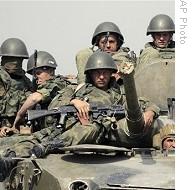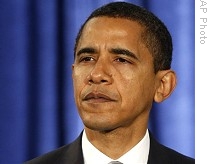voa标准英语2008-Resurgent Russia Poses Challenge for Obama Admin
搜索关注在线英语听力室公众号:tingroom,领取免费英语资料大礼包。
(单词翻译)
One of the key foreign policy questions facing the incoming Obama administration is how to deal with a resurgent Russia?Most analysts1 agree that after Barack Obama is sworn in as the 44th U.S. president on January 20, his administration's main challenge will be how to deal with the global financial and economic crisis. But many experts also say Mr. Obama will have to focus his attention on rebuilding relations between Washington and Moscow, relations that most analysts describe as poor.
 |
| Russian soldiers on top of an armed personnel carrier near Khurvaleti, 60 km northwest of Tbilisi, 22 Aug. 2008 |
The relationship between the United States and Russia reached a low point this year, following the August five-day war between Georgia and Russia. Washington strongly criticized Moscow's massive military invasion of Georgia in response to Tbilisi's abortive2 attempt to take over the capital of the breakaway region of South Ossetia.
Many experts, including Stephen Jones from Mount Holyoke College in Massachusetts, say based on Mr. Obama's statements on the Russia-Georgian war, his policy toward Moscow is unclear.
"His first statement when he was on holiday in Hawaii was a rather moderate one, calling on both sides to come together and negotiate out of this. But his subsequent statements were more militant3 and condemned4 primarily Russia. I think this might in part have been the influence of Vice-President [-elect] Joe Biden who had made a visit to Georgia before the invasion in August and is close to [Georgian] President Misha Saakashvili," said Jones.
While the recent Russia-Georgia war cast a shadow on U.S.-Russian relations, experts say there are other major disagreements between Washington and Moscow. One of those is the Bush administration's backing of Georgia and Ukraine to become members of the North Atlantic Treaty Organization. Moscow is against that. Mr. Obama has indicated he favors NATO membership, but only when those two countries are ready.
Another point of disagreement is the U.S. plan - also strongly opposed by Moscow - to put an anti-missile defense5 shield in Eastern Europe - 10 missile interceptors in Poland and a radar6 station in the Czech Republic.
 |
| President-elect Barack Obama listens to a reporter's question during a news conference in Chicago, 26 Nov. 2008 |
Mr. Obama's advisers7 say he supports the missile-defense system, but only when the technology is proven to be workable.
Experts say despite differences on major issues, there are areas where Moscow and the new Obama administration could cooperate, especially in the economic arena8.
"The United States could offer economic guidance to the Russians who are now having a recession or are on the verge9 of a depression," said Marshall Goldman of Harvard University. "Their stock market actually has fallen by a larger percentage than that in the United States. We have had more experience - our economic people have had more experience with recessions and depressions. And it might be worthwhile to convene10 a meeting of the heads of the president's Council of Economic Advisers in the United States and the economic advisers in the Kremlin to talk about common ways we could work with each other to prevent a deterioration11 in the world economy and to see if there are other ways we could help each other go through this very trying time."
Analysts say other areas where cooperation could be stepped up are fighting terrorism, energy security, and nuclear arms control and nonproliferation.
Robert Legvold from Columbia University says that shortly after his inauguration12, President Obama should deliver a major speech.
"A presidential address or a major part of a presidential foreign policy address that lays out what the administration would like to accomplish in constructive13 terms with the Russians and where Russia fits into U.S. foreign policy," said Legvold. "We have not had a presidential address of that kind in 15 years. Not since 1993 at Annapolis [at the U.S. Naval14 Academy], before President Bill Clinton was to meet Boris Yeltsin for the first time, has an American leader spelled out U.S. policy toward Russia. It is time that a new American president do that again."
Other experts are also calling for a meeting between President Obama and Russian leader Dmitri Medvedev in the first few months of the new U.S. administration. They say such a meeting would inject new life in a relationship that needs to be given a positive jolt15.
 收听单词发音
收听单词发音 




